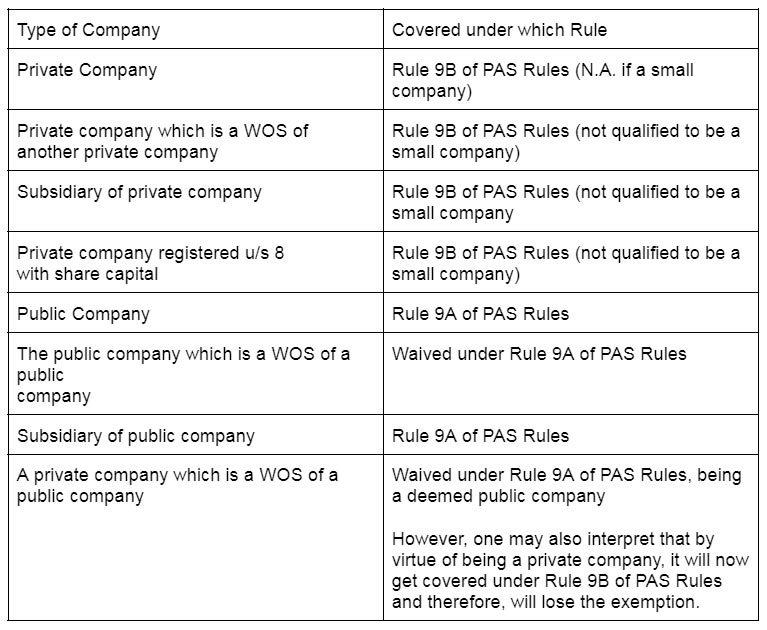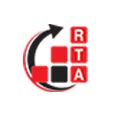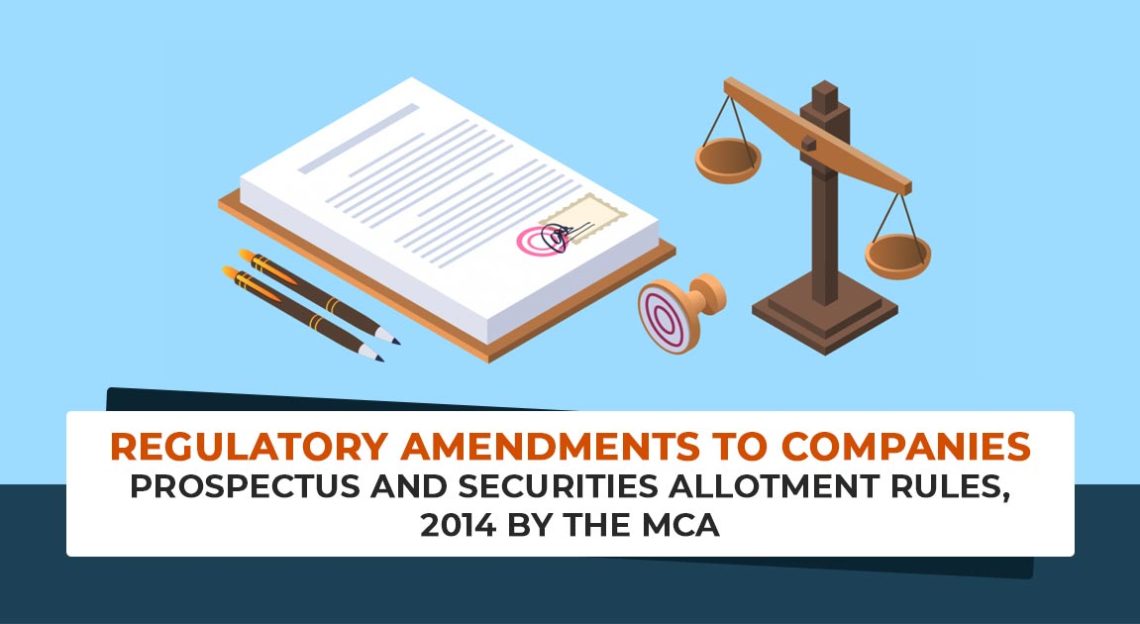Under section 29(1A) of the Companies Act, 2013 (‘the Act’), the Ministry of Corporate Affairs (‘MCA’) is authorized to define such classes of companies that can hold or transfer the securities just in dematerialized form.
Under such authority, MCA, vide notification on September 10, 2018, inserted Rule 9A in the Companies (Prospectus and Allotment of Securities) Rules, 2014 (‘PAS Rules’), requiring every unlisted public company to hold and issue securities only in demat form.
Vide notification on October 27, 2023 (‘Present Amendment’), MCA extended such a need to private companies. The MCA has inserted Rule 9B in the PAS Rules providing for mandatory dematerialisation of securities of private companies (non-small companies).
In these FAQs, we have attempted to examine the revisions and addressed the questions that private companies, except small companies, might raise to dematerialise their securities.
Applicability of the Present Amendment
Question: 1. Which firms are surrounded by the Present Amendment?
Answer: The amendment applies to all private companies, except small companies and government companies.
Question: 2. Whether the Present Amendment apply to small companies?
Answer: The present amendment does not include small companies. As described u/s 2 (85) of the Act, small companies are companies, other than a public company, including paid-up share capital not exceeding Rs. 4 crores and turnover not exceeding Rs. 40 crores. But, a holding company or a subsidiary company, a company registered u/s 8, or a company or body corporate controlled by any special Act will not be regarded as a small company. Therefore, such companies will need to follow the mandatory demat norms.
Question: 3. Whether a Section 8 Company with Share Capital Counted Beneath the Present Amendment?
Answer: Yes, under the Present Amendment, Section 8 companies will get covered irrespective of the quantum of share capital.
Question: 4. Whether a Section 8 Company Restricted by Guarantee is Counted Beneath the Present Amendment?
Answer: No. Since there is no share capital for a section 8 company restricted by guarantee, the Present amendment shall not be applicable.
Question: 5. Whether a Private Company, Which is a Holding/Subsidiary Company of Another Private Company, is in the Present Amendment?
Answer: When a private company is a subsidiary of another private company or is a holding company of another private company, then even when the paid-up and turnover counted within the parameters show for a small company, the same shall not be regarded as a small company, consequently will be needed to follow with the Present amendment.
Question: 6. After 1st April 2023, What if a Company Ceases to be a Small Company?
Answer: The position is mandated to be investigated on the final day of a fiscal year. After 1st April 2023, if a company ceases to be a small company, it will be required to adhere to the provisions within 18 months from the closure of the fiscal year, i.e. from 31st March 2024, and ought to adhere by 30th September 2025.
Question: 7. Whether the Present Amendment Apply to wholly-owned Subsidiaries?
Answer: Yes, the present amendment applies to wholly-owned subsidiaries. The available exemptions under Rule 9A (11) do not apply to private companies under Rule 9B.
Question: 8. Will the Present Amendment Apply to Nidhi Companies?
Answer: The present amendment is to be undertaken for the private companies that are not counted under the small companies, and Nidhi Companies are mandatorily incorporated as public companies. Hence, Nidhi companies are not counted under the present amendment. Also, from the applicability regarding Rule 9A (11) of the PAS Rules, Nidhi companies are exempted.
Question: 9. Is the Present Amendment Applicable to a Private Company that is Considered to be a Public Company? What if the Stated Company is a Wholly-Owned Subsidiary?
Answer: For the objective of the provision of the act, a private company, which is a subsidiary of a public company, is constitutionally a private company however, it is considered as a public company. Therefore, under Rule 9A of the PAS Rules, a company considered a public company is already covered. In which this considered public company was a wholly owned subsidiary, the same was waived from the Rule 9A applicability. In the opinion of the present amendment being a private company, the same shall be needed to adhere to Rule 9B. Concerning Rule 9A, the exemption will cease to be applicable.
The examination of the foundation of the company and holding structure has been stated below-

Question: 10. Whether the Amendment applies only to Shares or other Securities as well?
Answer: The Present Amendment utilises the word “securities” and thus, it applies to all sorts of securities, i.e., equity shares, preference shares, debentures, warrants, etc.
Actionable Emerging via Present Amendment
Question: 11. What are the Quick Actionables Emerging out of the Amendment?
Answer: A private company that is counted under the present amendment will be needed to
- Receive an ISIN for all the current securities issued by the company,
- Streamline dematerialisation of all existing securities (as and when the request is obtained via the holder of such securities),
- Assure that the holdings of its promoters, directors, and KMPs are held in dematerialised form exclusively, before making any offer for issuance or buyback of securities on or after September 30, 2024
- Only in the dematerialised form, issue all securities
Question: 12. What is the Methodology for Dematerialising the Securities?
Answer: The procedure of Dematerialisation is where the physical certificates are converted into electronic form with an equivalent number of securities and credited into the beneficial owner’s demat account. The process for dematerialisation is as under:
Question: 13. Whether the Company Needed to Appoint a Registrar and Share Transfer Agent (‘RTA’)?
Answer: For streamlining dematerialisation, the role of RTA is to act as an intermediary between the issuer and the depository and corporate measures are performed via the issuer subsequently. The same verifies the request obtained for the dematerialisation via the depositary participant and forwards it to the Company.
Under the Act, the same is not compulsory to appoint the Registrar and Share Transfer Agent when the company secures an in-house arrangement. As per that, where an RTA is not hired, the company shall be required to undergo the cited activities to enable the dematerialisation of securities kept by the investors.
Question: 14. Whether the Private Companies Covered Under Rule 9B Ought to Maintain a Register of Members?
Answer: No. As per Section 88 (3) of the Act, the register and index of beneficial owners maintained by a depository u/s 11 of the Depositories Act, 1996 (22 of 1996), will be regarded to be the corresponding register and index for the Act.
Question: 15. If the Company loss to adhere to the Provisions of the Present Amendment, then what will be the Result?
Answer: No specific penalty was established u/s 29 of the Act, and thus, the penalty as per Section 450 of the Act will apply.
According to section 450 of the act, the company and every officer of the company who is in default shall be obligated to a penalty of Rs 10,000. If there is a continuous case of violation, with an additional penalty of Rs 1000 for each day post the first during which the breach carried on, within the maximum of Rs 2,50,000 in case of a company and Rs 50,000 in case of an officer who is in default or any other person.
Issue of Securities By Private Companies
Question: 16. Can a Private Company Provide Securities in Physical Form Before 30th September 2024?
Answer: Yes, private companies are enabled to issue securities in physical form before 30th September 2024, but the same will ensure such securities are dematerialised on or before 30th September 2024.
Question: 17. Can a Private Company Provide Securities Post 30th September 2024 if all the Securities have not been Dematerialised via the Shareholders/Investors?
Answer: As per Rule 9B of the PAS Rules, if the promoters, directors, and key managerial personnel have dematerialised their holdings, the company is qualified to make an offer for the issue of securities in dematerialised form. Only where the securities are aimed to be kept in dematerialised form, the subscribers will be able to apply.
Transfer of Securities
Question: 18. Can a Holder of Securities of a Private Company Transfer these Securities in Physical Form before 30th September 2024?
Answer: Yes, it is possible that a securities holder of a private company can transfer the securities in physical form before 30th September 2024. Hence, it can be attained in dematerialised form only.
Question: 19. Can a Shareholder Persist to keep the Shares in Physical Form even after 30th September 2024?
Answer: A shareholder, unless a promoter, director, or KMP, may continue to hold shares in physical form even after 30th September 2024. The said shares can be transferred until dematerialised. Additionally, the shareholder is enabled to subscribe to any issue only after ensuring the dematerializing of the securities.
Question: 20. Whether Dematerialisation of Shares Consequences in Free Transferability, Violating Section 2 (68) of the Act?
Answer: Section 2 (68) of the Act stipulates a private company and a feature of a private company is the right to restrict the transfer of shares. Under Section 58 (1) of the Act, a private company has the authority to reject registration of the transfer of shares. Dematerialisation of shares under Rule 9B of the PAS Rules cannot be said to follow the Company as non-compliant with Section 2 (68) read with Section 58.
Depositories propose an optional facility to uphold the ISIN under the status ‘Frozen for Debit’ to private companies to ensure that the holders do not transfer the securities in dematerialised form.
Continual Compliances
Question: 21. What are the Additional Compliances to be Ensured via Private Companies?
Answer: It is obligated for the private companies to ensure compliance, subject to being applied to the unlisted company under sub-rules (4) to (10) of Rule 9A, which are summarised as under:
- Rule 9A (4): Streamlining of dematerialisation of all its current securities via making
- Critical application to a depository and secure International Security Identification Number (ISIN) for each type of security. Report all its current security holders regarding such a facility
- Rule 9A (5): Timely payment of fees (admission as well as annual) needs to be assured to the depository and Registrar to issue and share a Transfer Agent (‘RTA’) under the agreement. Keep a security deposit of not less than 2 years’ fees with the depository Registrar and Transfer Agent at all times. Adhere to the statutes or directions/guidelines or circulars, if any, administered by SEBI or Depository over time concerning the dematerialisation of shares and matters incidental or corresponding thereto
- Rule 9A (6): Prohibiting making any offer or buyback, or issuing any bonus or right
- shares till the payments are induced in the depositories or RTA.
- Rule 9A (7): Adhere to the applicable provisions of the Depositories Act 1996, SEBI (Depositories and Participants) Regulations, 2018 and SEBI (Registrars to an Issue and Share Transfer Agents) Regulations, 1993.
- Rule 9A (8): Filing eForm PAS-6 to the ROC within 60 days from the judgment of each
- half-year, duly certified by a company secretary in practice or a chartered accountant in practice.
- Rule 9A (8A): Bring to the notice of the depositories any distinction marked in its issued capital and the capital held in dematerialised form.
- Rule 9A (9) & (10): If there are any grudges, the security holders will be notified of the
- Investor Education and Protection Fund Authority (IEPFA). IEPFA will take any action
- against a depository participant or RTA/STA after prior consultation with SEBI.
Question: 22. What are the Filing Essentials?
Answer: Private companies shall be required to file the Form PAS-6 before the ROC within 60 days from the end of each half-year. For the half-year duration from April to September, 29th November will be the last date to file Form PAS-6, and for the duration from October to March, the deadline will be 30th May.
Question: 23. Will the Private Companies be Mandated to file Form PAS-6 for the Half-Year Ending September 2023?
Answer: After 18 months from the closure of FY 22-23, i.e., from October 01, 2024, the provisions of the Present Amendment are applicable and thus the companies will be required to file form PAS-6 for the half year starting from October 2024, hence, the first PAS-6 will be filed for the half year ended March 2025.
Securities Dematerialisation
Question: 24. In what way does the Company Streamline the Dematerialisation of its Securities?
Answer: The companies can enrol themselves on the NSDL portal, which intends to issue or furnish the securities in demat mode, fill the required form along with necessary documents, verify it, and submit the physical copies of such documents. The companies may be directed to the detailed process given on the CDSL & NSDL website.
Question: 25. What does the term ISIN signify?
Answer: SEBI FAQs on Dematerialization elaborates on ISIN (International Securities Identification Number) as a unique 12-digit alphanumeric identification number allotted for security (E.g., INE383C01018). Additionally, all kinds of securities, such as equity fully paid up, equity-partly paid up, equity with differential voting /dividend rights, preference shares, and debentures issued via the same issuer, will have distinct ISINs.
Question: 26. Who is Mandated to Apply for the Dematerialisation of Securities?
Answer: To secure an ISIN with a depository for each type of security and inform all its current security holders of such a facility, the company needs to make an application. The shareholders shall need to open a demat account with a Depository Participant and initiate the process of demat by giving the Demat Request Form (DRF) along with the share certificates for dematerialization.
Question: 27. What is the Opening Procedure for a Demat Account?
Answer: The opening method for a demat account is identical to that of opening a Bank account. The investor needs to select a DP 2 who will assist in completing the formalities. The investors are required to fill up a form and submit their PAN card, proof of address, and bank account details.
All the DPs deliver the facility of opening an account online. A demat account can be opened by the applicant from the website of NSDL or via DPs registered with CDSL or NSDL. (Refer to FAQ No. 12 of FAQ’s on Dematerialisation of shares).
Question: 28. Is there any Need to file the Stamp Duty during an Initial Transaction for a Demat?
Answer: Stamp duty is subjected to get paid during the issue of shares under the provisions of the Stamp Act, 1899, no stamp duty is there that is liable to get paid on the initial transaction for the demat of shares. (Refer to FAQ No. 13 of FAQs on Dematerialisation of shares).
Question: 29. What are the Expenses an Investor Needs to incur to Open and maintain a Demat Account?
Answer: No account opening charges will be there, but distinct additional charges such as account maintenance, transaction charges, pledge creation, pledge closure, etc, are charged by DPs. On the website of NSDL, a comparison of fees levied by the DPs can be accessed.









